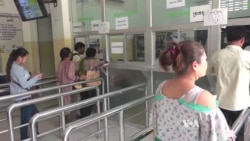ກຳປູເຈຍມີສະຖິຕິກ່ຽວກັບບັນຫາໂຣກຈິດ ຮ້າຍແຮງທີ່ສຸດໃນ
ໂລກ ສ່ວນ ໃຫຍ່ ກໍເນື່ອງມາຈາກຜົນກະທົບ ໃນການຂ້າລ້າງ
ໂດຍອຳນາດການປົກຄອງ ປອນປົດ ຂອງພວກຂະເໝນແດງ.
ບໍ່ພໍພຽງແຕ່ເທົ່ານັ້ນ ການໃຫ້ບໍລິການດ້ານ ໂຣກຈິດ ຍັງບໍ່ໄດ້
ຮັບເງິນສະໜັບສະໜຸນພຽງພໍ ແລະອີງຕາມຄຳເວົ້າ ຂອງອົງ
ການອະນາໄມໂລກແລ້ວ ແມ່ນ “ບໍ່ໄດ້ຮັບການເອົາໃຈໃສ່ ຢ່າງ
ຮ້າຍແຮງ.” ມີຮ່ອງຮອຍເລັກນ້ອຍທີ່ສະແດງໃຫ້ເຫັນວ່າ ຈະມີ
ການປ່ຽນແປງໃນອະນາຄົດອັນໃກ້ນີ້ ສ່ວນນຶ່ງກໍເນື່ອງຈາກວ່າ
ບັນດານັກສຶກສາກຳປູເຈຍ ພາກັນມີຄວາມສົນໃຈທາງດ້ານ
ວິຊາອາຊີບຈິດຕະແພດ. Robert Carmichael ມີລາຍງານ
ຈາກ ນະຄອນພະນົມເປັນ ຊຶ່ງ ກິ່ງສະຫວັນ ຈະນຳມາສະເໜີທ່ານ.
ຄລິນິກຈິດຕະແພດ ຢູ່ໂຮງໝໍ ຂະແມ-ໂຊວຽດ ຂອງລັດຖະບານ ໃນນະຄອນຫຼວງພະນົມເປັນ
ເປັນບ່ອນນຶ່ງທີ່ມີຄົນມາປິ່ນປົວຫລາຍທີ່ສຸດໃນກຳປູເຈຍ.
ຜູ້ອຳນວຍການຄລິນິກ ທ່ານ Yem Sobotra ກ່າວວ່່າ ເມື່ອສິບຫ້າປີກ່ອນ ມີຜູ້ມາປິ່ນປົວລະຫວ່າງ 70 ຫາ 150 ຄົນຕໍ່ມື້. ເວລາວີໂອເອ ໄປຢ້ຽມຢາມໃນເດືອນເມສາທີ່ຜ່ານມາ ມີ
ຜູ້ໄປປົວສະເຫລ່ຍແລ້ວ 400 ຄົນໃນແຕ່ລະມື້.
ມີການບໍລິການໃນດ້ານໂຣກຈິດແຕ່ພຽງເລັກນ້ອຍຢູ່ຕາມຊົນນະບົດ ບ່ອນທີ່ຊາວກຳປູ
ເຈຍສ່ວນໃຫຍ່ພາກັນອາໄສຢູ່ ແລະບັນດາຄົນປ່ວຍ ຕ້ອງໄດ້ພາກັນມາຫາ ສູນກາງ
ແບບນີ້ເພື່ອທຳການປິ່ນປົວ.
ແຕ່ວ່າມີຈິດຕະແພດພຽງແຕ່ 10 ຄົນ ແລະນາງພະຍາບານໃນຈຳນວນເກືອບທໍ່ກັນ ຄົນປ່ວຍເກືອບທັງໝົດ ມີເວລາພຽງແຕ່ບໍ່ເທົ່າໃດນາທີ ກ່ອນອອກຈາກໂຮງ ໝໍໄປພ້ອບກັບ
ຢາກ່ອງນຶ່ງ.
ດຣ. Yom Sobotra ກ່າວວ່າ ເຂົາເຈົ້າສາມາດເຮັດໃຫ້ດີຂື້ນໄດ້ກວ່ານີ້ ຖ້າໄດ້ ຮັບທຶນ
ຮອນຕື່ມຂຶ້ນ.
ດຣ. Yom Sobotra ກ່າວວ່າ “ພວກເຮົາບໍ່ມີເວລາພຽງພໍ ທີ່ຈະໃຫ້ບໍລິການຢ່າງດີ
ແກ່ເຂົາເຈົ້າ ໂດຍສະເພາະການປິ່ນປົວໂຣກຈິດ. ພວກເຮົາພຽງແຕ່ໃຫ້ຄຳແນະ
ນຳເລັກໆນ້ອຍໆ ໃຫ້ຄຳປຶກສາສັ້ນໆ ກ່ຽວກັບຟື້ນຟູສະພບຈິດແກ່ຄົນປ່ວຍ.
ນັ້ນແມ່ນຄວາມຄິດຂອງຂ້າພະເຈົ້າ ທີ່ບໍ່ແມ່ນການບໍລິການຢ່າງພຽງພໍ ບໍ່ມີຊັບ
ພະຍາກອນມະນຸດຢ່າງພຽງພໍ.”
ບັນຫາທ້າທາຍ ບໍ່ໄດ້ຢຸດຢູ່ທີ່ນັ້ນ ກຳປູເຈຍ ຂາດຢາສະໄໝໃໝ່ ທີ່ໃຊ້ກັນຢູ່ໃນ ຫວຽດ
ນາມ ແລະໄທ ທີ່ເປັນປະເທດເພື່ອນບ້ານ ບັນຫາໂດຍສະເພາະ ກໍແມ່ນ ໃນເວລາສັ່ງຢາ
ໃຫ້ຄົນປ່ວຍ ທີ່ມີສະພາບບັນຫາຫົວໃຈ.
ນອກນັ້ນ ກໍຍັງມີຄວາມຕ້ອງການຈິດຕະແພດຫລາຍຂື້ນ ແຕ່ກໍມີບັນດາຊາວໜຸ່ມ ທີ່ເບິ່ງ
ຄືວ່າມີຄວາມສົນໃຈໃນເລື້ອງນີ້.
ໃນທົ່ວປະເທດ ມີພຽງແຕ່ນັກສຶກສາຫົກຄົນ ທີ່ກຳລັງຮຽນວິຊານີ້ ຊຶ່ງຈະໃຊ້ເວລາ ຢູ່ສາມ
ປີ. ບັນດາຜູ້ຊ່່ຽວຊານ ໄດ້ຖິ້ມໂທດໃສ່ເລື້ອງເງິນເດືອນຕຳ່ໂພດ ແລະບັນຫາທ້າທາຍ
ຂອງການຮຽນຈິດຕະແພດ.
ອົງການ TPO ກຳປູເຈຍ ເປັນອົງການທີ່ໄດ້ຮັບ ຄວາມເຄົາລົບນັບຖືໃນດ້ານໂຣກຈິດ ທີ່
ບໍ່ຫວັງຜົນກຳໄລ.
ດຣ. Chhim Sotheara ຫົວໜ້າອົງການ TPO ກ່າວວ່າ ກຳປູເຈຍ ມີຄວາມຕ້ອງການຫລາຍຢ່າງ ແຕ່ມີຊັບພະຍາກອນພຽງເລັກນ້ອຍ ໂດຍສະເພາະຢູ່ຕາມເຂດຊົນນະບົດ
ແລະ ລັດຖະບານກໍບໍ່ໄດ້ໃຫ້ການຊ່ວຍເຫລືອຢ່າງພຽງພໍ.
ໂຄງການທີ່ມີການໂອນຄວາມຊຳນິຊຳນານ ອາດຈະຊ່ວຍເຫລືອໄດ້.
ດຣ. Chhim Sotheara ກ່າວວ່າ “ພວກເຮົາບໍ່ມີໃຜເຂົ້າຮຽນ ໃນໂຄງການເຝິກອົບຮົມດ້ານໂຣກຈິດ ເພາະສະນັ້ນ ມັນກໍຈະບໍ່ເກີດຂື້ນ. ຂ້າພະເຈົ້າຄິດວ່າ ການ
ມອບໂອນຄວາມຊຳນິຊຳນານຈາກ ພວກນັກຊ່ຽວຊານດ້ານໂຣກຈິດ ໄປຫານາຍ
ໝໍເຝິກແອບຫຼື GP ຈາກ GP ໄປຫານາງພະຍາບານ ໄປຫາກຸ່ມສະໜັບສະໜຸນຢູ່ຕາມໝູ່ບ້ານ ບັນດາໝໍແຜນໂບຮານ ພະສົງອົງຄະເຈົ້າ ແມ່ຊີ ແລະທັງໝົດນີ້
ຈະເປັນການດີ.”
ຢູ່ທີ່ ກະຊວງໂຣກຈິດ ແລະຕິດສິ່ງເສບຕິດ ທີ່ຫາກໍສ້າງຕັ້ງຂຶ້ນໃໝ່ ຂອງລັດຖະບານ
ຮອງຜູ້ອຳນວຍການ ດຣ. Muny Sothara ກ່າວວ່າ ບັນຫາຕ່າງໆໄດ້ດີຂື້ນຫວ່າງບໍ່
ເທົ່າໃດປີທີ່ຜ່ານມາ ແຕ່ກໍຮັບຮູ້ວ່າຍັງຕ້ອງເພີ້ມເຕີມອີກຫຼາຍສິ່ງຫຼາຍຢ່າງ.
ດຣ. Muny Sothara ກ່າວວ່າ “ໃນອະນາຄົດນີ້ ພວກເຮົາຕ້ອງໄດ້ປັບປຸງຄຸນນະພາບ
ຂອງບັນດາພະນັກງານທີ່ໄດ້ຮັບການເຝິກແອບຢູ່ໃນປັດຈຸບັນແທນແລະ ນອກນັ້ນຍັງ
ຕ້ອງໝູນໃຊ້ບັນດານາຍໝໍທີ່ຈົບໃໝ່ ແລະນາງພະຍາບານ ເພື່ອຈະບໍລິຫານງານໜ່ວຍ
ຈິດຕະແພດຫລາຍຂື້ນຢູ່ໃນເຂດຕ່າງໆ.”
ເຖິງແມ່ນວ່າໄດ້ມີຮ້ອງຂໍຊຳ້ແລ້ວ ຊຳ້ອິກກໍຕາມ ແຕ່ບັນດາເຈົ້າໜ້າທີ່ ກໍບໍ່ສາມາດບອກ
ວີໂອເອ ໄດ້ວ່າມີນາຍໝໍ ແລະນາງພະຍາບານຈັກຄົນ ທີ່ໄດ້ຮັບການເຝິກອົບຮົມກ່ຽວ
ກັບພື້ນຖານຂອງໂຣກຈິດ.
ແລະຈາກການໄດ້ຮັບທຶນທີ່ຢູ່ໃນຂອບເຂດຈຳກັດ ບາງທີ ນຶ່ງລ້ານໂດລາຕໍ່ປີນັ້ນ ຈຶ່ງມີ
ທ່າທາງວ່າ ບັນດາຜູ້ຕ້ອງການຢາກໄດ້ຮັບບໍລິການດ້ານໂຣກຈິດທີ່ດີຂື້ນນັ້ນ ຄົງຈະບໍ່
ໄດ້ເຫັນການປັບປຸງໃຫ້ດີຂື້ນໃນໄວໆນີ້ ແຕ່ຢ່າງໃດເລີຍ.
Cambodia has some of the world’s worst mental health statistics – largely due to the effects of Pol Pot’s murderous Khmer Rouge regime. Yet mental health services remain underfunded and – in the words of the World Health Organization – “critically neglected." There’s little sign of that changing in the near future, in part because few Cambodian students are interested in psychiatry as a career.
The psychiatric clinic at the government’s Khmer-Soviet Hospital in Phnom Penh is one of Cambodia’s busiest.
Fifteen years ago, said clinic director Yem Sobotra, it saw between 70 and 150 patients a day. When VOA visited in April, the daily average was 400.
With few mental health services in rural areas, where most Cambodians live, patients have to come to centers like this for treatment.
But with just 10 psychiatrists and as many nurses, most get just a few minutes before leaving with a bottle of pills.
Dr. Yem Sobotra said they could do better with more resources.
“So we [have] not much time to give good service for them – especially for psychotherapy. We just only [offer] some short [term] counseling, short [term] psychotherapy for the patient. That is my idea – not enough for service, not enough for human resources,” he said.
The challenges do not end there: Cambodia lacks the advanced drugs used in neighboring Vietnam and Thailand – a particular problem when prescribing for patients with heart conditions.
It also needs more psychiatrists – yet few youngsters seem interested.
Nationwide just six students are taking the three-year course. Experts blame low salaries and the challenges of studying psychiatry.
TPO-Cambodia is a respected mental health non-profit.
Dr. Chhim Sotheara, who heads TPO, said Cambodia had many needs, few resources – particularly in rural areas – and a government that was not doing enough.
A skills-transfer program would help, he said.
“We don’t have anyone enrolling in the psychiatry training program, so that’s not going to happen. So I think the transferring skills from the specialist psychiatrist to GP, GP to nurse, to village health support groups, traditional healers, the monks, the nuns – and all this would be good,” he said.
At the government’s newly formed Department of Mental Health and Substance Abuse, Deputy Director Dr. Muny Sothara said matters have improved in recent years, but acknowledged more was needed.
“For the coming future we need to improve the quality of the existing trained staff instead, and also additional mobilize new general practitioners and nurses in order to operate more mental health units in other sectors down,” he said.
Yet despite repeated requests, officials were unable to tell VOA how many doctors and nurses it has trained in mental health basics.
And with limited funds allocated – perhaps $1 million a year – it is unlikely that those in need of better mental health services will see improvements soon.





